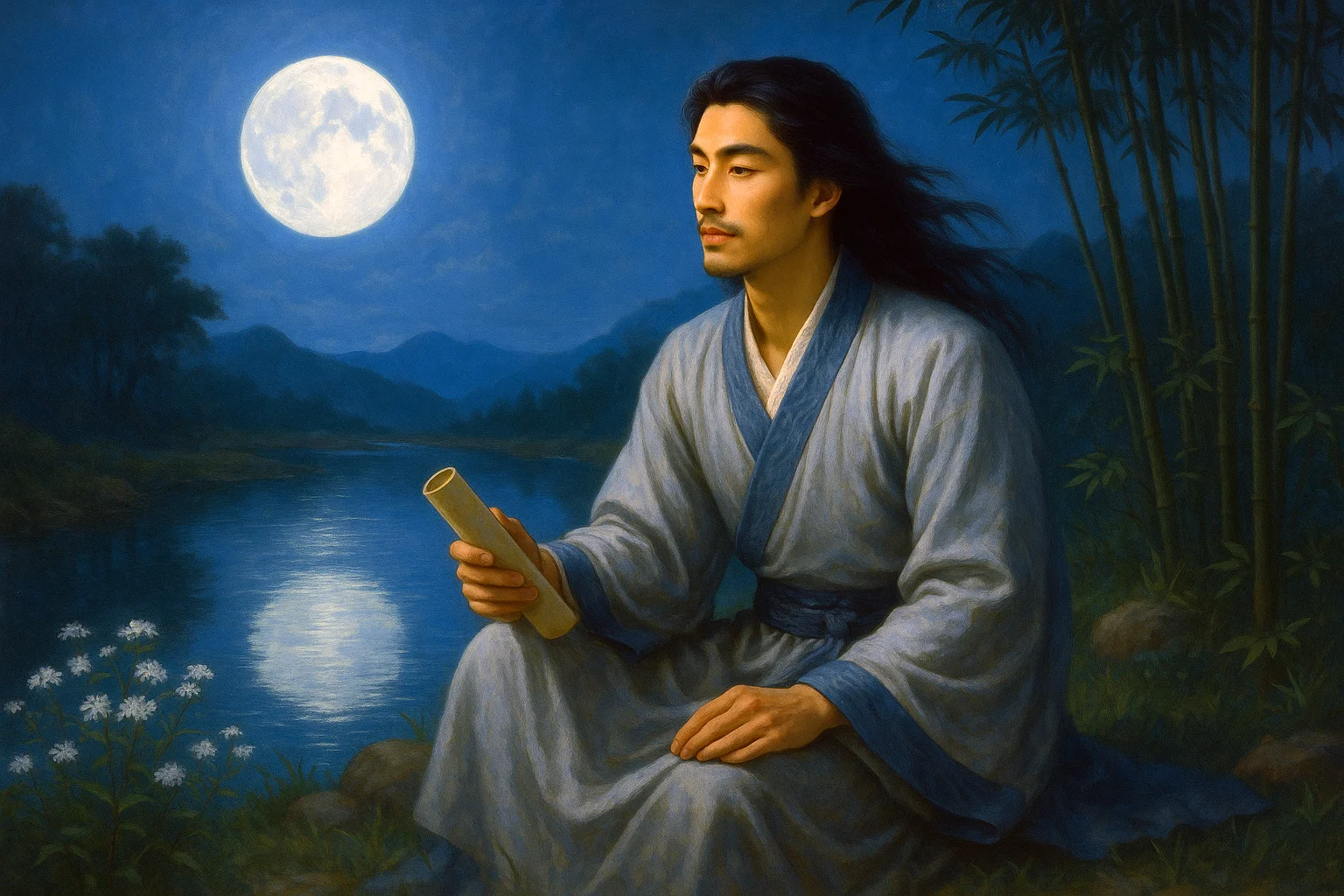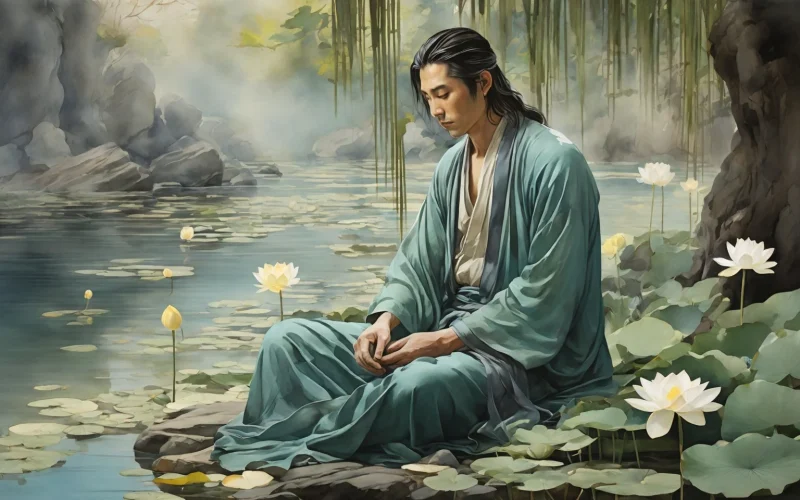A cosmos in concentric ripples sleeps,
Each lotus flame at fingertip-distance keeps.
Cliff-steals-sky's ancient tattoo whole,
Jade-mirror wears moss as memory's scroll.
Three autumns' stone-water romance fed,
Never betrayed my river-wanderer's thread.
Now my reflection mourns time's theft—
Snowmelt hair floods the jade hairpin left.
Original Poem
「盆池」
曾巩
环环清泚旱犹深,炳炳芙蓉近可寻。
苍壁巧藏天影入,翠奁微带藓良侵。
能供水石三秋兴,不负江湖万里心。
照影独怜身老去,日添华发已盈簪。
Interpretation
Composed in Zeng Gong's later years, likely during his service as a local official or retirement, this poem contemplates a scholar's courtyard pond (盆池) - a microcosm of nature that inspires profound reflections on time's passage and aging. Through this intimate landscape, Zeng reveals his serene state of mind and transcendent outlook on life's autumn years.
First Couplet: "环环清泚旱犹深,炳炳芙蓉近可寻。"
Huán huán qīng cǐ hàn yóu shēn, bǐng bǐng fúróng jìn kě xún.
In crystalline rings it persists through drought's harsh test; / Vibrant lotuses (芙蓉) bloom within arm's reach, self-possessed.
The paradox of drought-defying depth ("persists through drought" 旱犹深) mirrors the poet's resilient spirit, while the proximate lotuses symbolize accessible beauty in life's later chapters.
Second Couplet: "苍壁巧藏天影入,翠奁微带藓良侵。"
Cāng bì qiǎo cáng tiān yǐng rù, cuì lián wēi dài xiǎn liáng qīn.
Azure walls artfully swallow heaven's reflection; / Jade-bordered mirrors slowly suffer moss' infection.
The interplay between celestial imagery ("heaven's reflection" 天影) and earthly erosion ("moss' infection" 藓侵) creates a poignant metaphor for the body's aging while the spirit remains connected to the cosmos.
Third Couplet: "能供水石三秋兴,不负江湖万里心。"
Néng gōng shuǐ shí sān qiū xìng, bù fù jiānghú wàn lǐ xīn.
This water-and-stone fuels autumn's triple muse, / Honoring rivers-lakes (江湖) my youth would choose.
The miniature pond ("water-and-stone" 水石) becomes a worthy successor to youthful wanderlust ("rivers-lakes" 江湖), demonstrating how age transforms but doesn't diminish poetic inspiration.
Fourth Couplet: "照影独怜身老去,日添华发已盈簪。"
Zhào yǐng dú lián shēn lǎo qù, rì tiān huá fà yǐ yíng zān.
My mirrored image pities time's erosion; / Daily new snow-hairs crown my head's devotion.
The stark self-observation ("snow-hairs" 华发) achieves dignified pathos, with the hairpin (簪) becoming a measuring device for accumulated wisdom rather than merely a marker of decline.
Holistic Appreciation
This poem begins with an "object" as its muse, using a small scene to convey profound emotion, mirroring the passage of time in stillness and sketching life's essence in minute details. The poet starts with a courtyard basin-pond, gradually unfolding reflections on youth, beauty, aspiration, and aging.
The lines "lotus still findable" speak of present joys; "jade-green wall holding sky's reflection" serves as a metaphor for life's twilight glow; "water and rocks through three autumns" paints serene contentment; while "gazing at one's own reflection" reveals the poignancy of later years.
The poet masterfully fuses stillness with sentiment, employing refined yet understated language. The emotional arc deepens subtly—from scene to feeling, from external observation to inner contemplation—culminating in enlightened tranquility. This layered interplay of scene and philosophy enriches the poem's resonance.
Artistic Merits
- Microcosm to Macrocosm, Emotion Through Scenery
Though the subject is modest ("basin-pond"), it becomes a vessel for the poet's meditation on life and temporality. - Clear Progression, Natural Rhythm
Each couplet stands as an independent vignette, building from description to metaphor, then to introspection—a tightly woven structure. - Elegant Simplicity, Profound Depth
Eschewing flamboyance for restraint, the poem uses classical elegance to express clarity of mind and the weight of lived experience.
Insights
This poem offers a vital life lesson: even when physical space is confined (like a basin-pond), the heart can embrace vastness akin to rivers and lakes. Confronting aging and graying hair, the poet responds not with fear but by drawing serenity and strength from his surroundings. It reminds us that though life may seem simple and time unrelenting, a purposeful heart and perceptive gaze can sustain luminous dignity—poetry in being.
About the Poet

Zeng Gong (曾巩, 1019 - 1083), a native of Nanfeng in Jiangxi province, stands among the illustrious "Eight Great Masters of Tang-Song Prose." His writings distinguished themselves through an elegant classical balance, celebrated for their rigorous argumentation and refined literary craftsmanship. While his poetry embraced an artless subtlety, his prose achieved what critics hailed as "the very essence of purity" - an achievement that, though perhaps less dazzling than his contemporaries like Su Shi or Wang Anshi, earned him posthumous reverence as the founding master of the "Nanfeng Literary School."












